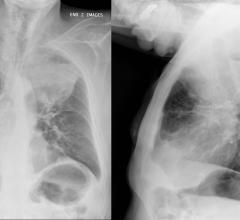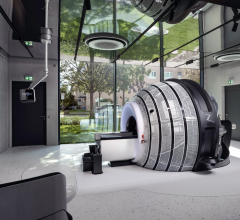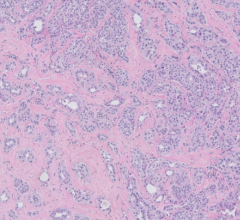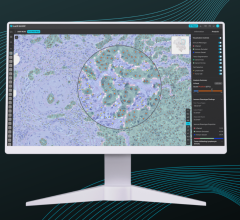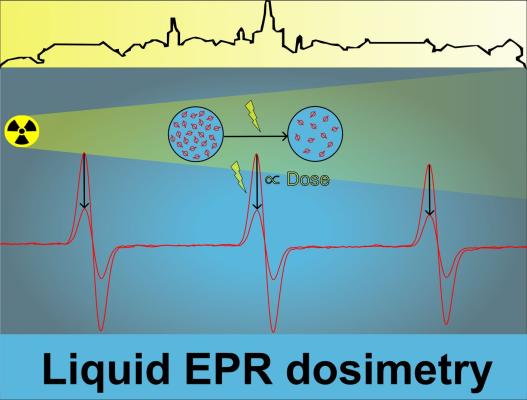
January 19, 2024 — Treating tumors is a global health issue. In radiotherapy, radiation is used to destroy tumor cells, while sparing healthy tissue. For each patient, physicians develop individual radiotherapy plans based on complex calculations. During treatment, it is important to check whether the planned radiation dose actually reaches the tumor as well as how much radiation also hits a patient's healthy tissue. As the water content of human soft tissue is high, the radiation dose is traditionally calculated and measured in water or water-equivalent bodies. In modern, highly complex radiation procedures, water equivalence also plays an increasingly important role for the dosimeters used.
In the context of the Consolidator Grant "SPICE" ("Spectroscopy in cells") awarded by the European Research Council in 2017, the research team of physical chemist Malte Drescher made a chance discovery that has the potential for creating such a water-equivalent dosimeter. Now, to develop the dosimeter, the team has received the Proof of Concept Grant "LIQUIDITY" ("Liquid Dosimetry via Electron Paramagnetic Resonance Spectroscopy") from the European Research Council with funding of 150,000 euros.
"LIQUIDITY": tracking probe molecules
To study the dynamics and structure of large molecules in cells using electron spin resonance spectroscopy, the researchers developed small probe molecules that carry an electron spin and are attached to a large molecule. By being exposed to the same radiation that is also used in tumor therapy, these probe molecules can now help measure the dose of radiation.
Malte Drescher summarizes the discovery: "We found that these probe molecules react very sensitively to radiation". This means that, during radiation, some probe molecules are destroyed and stop emitting signals. The higher the radiation dose, the more probe molecules lose their function. Research in the context of the new ERC (European Research Council) grant aims to utilize this discovery for an innovative method of quality assurance in radiation therapy.
The solution: a capsule filled with water
The idea is to develop a capsule filled with water in which the probe molecules float. The capsule will be attached to the patient's skin or placed in body cavities, for example. The number of probe molecules destroyed during radiation then shows the extent to which the dose received by the patient corresponds to the dose specified in the radiotherapy plan.
Sebastian Höfel, doctoral researcher in the research team and head medical physicist at the radiotherapy center in Konstanz, explains that the new dosimetry method could have several potential advantages. Firstly, the dosimeters are water-equivalent and can therefore be used under a wide range of conditions without any problems, as the previously complicated conversions to water doses would no longer be necessary. Secondly, it would be possible to produce small dosimeters that are only a few millimeters in size. In addition to that, the liquid state makes it possible to create flexible shapes that can be placed on the skin's surface or into cavities like the nose or mouth.
On the path to a clinical application of the new dosimeter, the researchers have set themselves three goals. First of all, they aim to find a material for the capsules that is optimal for clinical use. Secondly, the researchers want to find out exactly how the probe molecules are destroyed. Finally, a clinical study under real-life conditions will test the use of the new dosimeter whose components pose no health risks for patients.
Collaboration with future users
The "LIQUIDITY" project funded by the Proof of Concept Grant will be conducted in collaboration with the radiotherapy center in Konstanz (medical office Professor H. Zwicker & Partner) and the physics professor, Michael Fix, who is vice director of the radiation physics department at Inselspital Bern. "Our collaboration partners give us precise insights into the needs of the device's future users, namely clinics and radiotherapy practices", says Malte Drescher. As they develop the innovative dosimeter, researchers build upon corresponding basic research and quickly implement this knowledge in the application.
The Proof of Concept Grant
To support this process, the Proof of Concept Grant provides funding for a maximum of 18 months. The program is designed so that it can follow a previous ERC Grant. The Proof of Concept Grant complements research grants from the European Research Council (ERC) and is exclusively open to researchers with a prior ERC Grant who would like to exploit the corresponding research results in a follow-up project. The aim of the project is to evaluate the market potential of an idea and foster its readiness for application, commercialization or marketing.
For more information: https://www.uni-konstanz.de/


 April 25, 2024
April 25, 2024 


